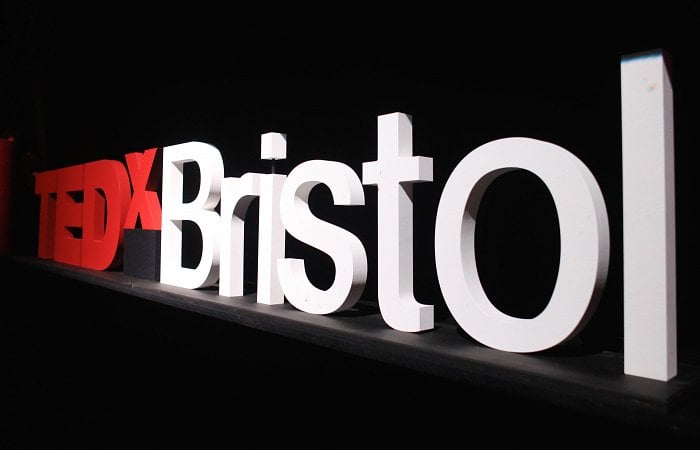TedxBristol 2015
November 26, 2015
 TedxBristol ticked all the boxes, but speakers differed in their opinions on how we should live alongside technology.
TedxBristol ticked all the boxes, but speakers differed in their opinions on how we should live alongside technology.
When I think of Ted talks, I think of all the hours I’ve spent on YouTube, bouncing between enticingly titled videos that cater to a whole spectrum of interests. TedxBristol 2015 certainly didn’t disappoint on the variety front, and the most powerful of the talks appealed to Bristol’s civic sensibilities and sense of collective responsibility – including a standing ovation for Al Crisci.
But a theme that stuck out at Colston Hall was an awareness of where we are going with our ever more internet-driven lives. One speaker, Meabh Quoirin, a trends-forecaster for Future Foundation, announced that her favourite emoji was the ‘Face with Tears of Joy’ – the emoji that just days later was revealed as Oxford English dictionary’s ‘word’ of the year. This announcement – to some people’s dismay – symbolises a willingness on the part of major cultural institutions to launch into and embrace our technological future. Presentations at TedxBristol reflected an acute awareness of the direction we are going in, with varying degrees of opinion on the matter.
Despite Quoirin’s charisma and her genuine belief in the power of social media, her talk ‘Feeling Emojinal: The New Social Network’, seemed to skim rather superficially over the issue of technological immersion. Asserting that our online profiles are extensions of ourselves, she boldly offered an almost utopian idea that if we aired more of our dirty laundry online, then we would all learn from each other emotionally and all become more genuine people in our offline lives. But flitting between how popular emojis are becoming (introducing a rather pointless emoji tracker) and totting up the benefits of bonding through our shared online presence, she seemed to over-magnify the civil benefits of social networks. Does more sharing really equate to more authenticity? It’s hard to see how simplified symbols of emotional states could increase our collective personal growth. As is the problem with many of the talks decorated with Ted status, a good speaker doth not a valid point necessarily make.
[pullquote align=”right” cite=”” link=”” color=”” class=”” size=””]Presentations reflected an acute awareness of the direction we are going in, with varying degrees of opinion on the matter.[/pullquote]
Other speakers had more ambitious ideas to share. Pipped to be the star of the show as a Ted-first, Dr Paul Bremner introduced the audience to his humanoid robot creation, complete with remembrance poppy and glowing blue panels. He proposed applications that robotics may have in the provision of care, especially to people who are socially isolated, tentatively suggesting that they might act in the treatment of loneliness. Addressing the crowd looking ‘through’ the robot’s webcam eyes, Bremner showcased his attempts to “bridge the gap” between video calls and face-to-face contact. This is certainly a noble cause, and the prospect of using technological advancements to reach those that need it is an exciting one. But giving robots human features, let alone responsibilities is undoubtedly a touchy subject. Should we really replace carers with computers?
Jane Evans, in her talk ‘Taming and Tending your Meerkat Brain’, expressed more concern than enthusiasm for the way we dive so readily into technology. In a presentation that was as fluffy as it was serious, she argued that giving children gadgets like iPads only serves to numb and mask the difficulties they can have developing into adaptive adults. After an introduction that included shocking statistics – that there are 26,000 babies in the UK currently on anti-depressants – she presented a child-friendly analogy of how the brain works, a tool she uses in her work. Her talk starkly contrasted with the ideas on offer earlier in the day, and displayed a very real growing awareness of how appropriately we deal with emotions in our day-to-day lives, an issue that Quoirin seemed happy to ignore.
Whether consciously or not, TedxBristol’s programmers pointed to this kind of thinking throughout the event, and Tom Savage’s speech, ‘Is Ambition Killing Us?’ ended the day on a contemplative note. A young entrepreneur, he shared his existential fears of wasting his life. Expressing his frustrations with our app-driven lives, he advocated our need to live life with a ‘spam filter’ on it.
Indeed, to shy away from the possibilities that advancements in technology provide us with would be archaic, but regulating our lives in the fast-moving technological world is something we all need to consider. Savage’s Tedx talk placed the day’s ideas in context: we have all this technology at our fingertips, but not all of it is nourishing.
Watch all the talks from TedxBristol 2015 online in the coming weeks.




Comments